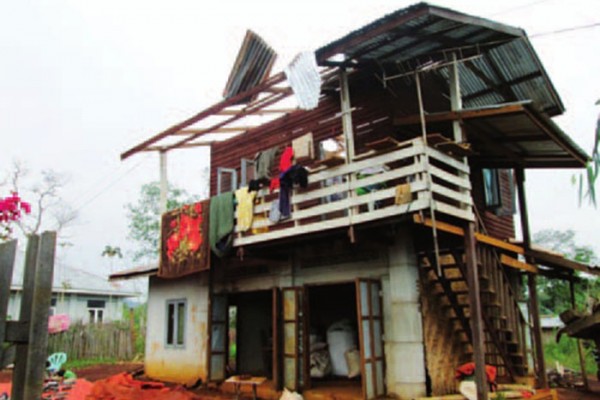Over 26,000 people that were relocated to make way for the Myitsone dam project from 2010 to 2012 haven’t been allowed to return, according to the “Model villages are not a model” report released last month by the Kachin human rights group Mungchying Rawt Jat (MRJ). This is despite of a Presidential decree that officially suspended the widely unpopular dam.

The government relocated them to Aung Myin Thar and Maliyang camps where conditions have been reported as very poor. Both camps are far from clean drinking water sources and consist of flimsy homes that are literally falling apart, according to residents.
Aung Myin Thar, the larger of the 2 camps consists of 317 households or 2,075 people from Mazup, Tang Hpre and Padang (Lahpe) villages. The Mali Yang camp has just over 120 homes or 500 people from Dawng Pan, Awng Ja Yang and Ding Ga Zup (Mali Yang) villages.
The Myitsone dam that was slated to be built where the Mali Hka and N’Mai Hka rivers merge to form Burma's mighty Irrawaddy would have been 152 meter high and first in a series of 7 dams on the upper river. Nearly all of the electricity generated was to be sent across the border into Yunnan. China's state owned China Power Investment (CPI) corporation is still pushing hard to kick start the project.
Almost all of the structures that were evacuated to make way for the Myitsone project have been completely destroyed, according to Kachin activists. The information was obtained after several illegal clandestine trips to the area. Large tracts of valuable farm land located along the river's edge have been uprooted to make way for cyanide intensive gold mining managed by local officials allied with businessmen.
MRJ's report quotes nearly a dozen farmers recounting similar tales of sorrow and despair. According to the farmers prior to their forced relocation they could raise enough crops on their land to support their families. Now it’s nearly impossible at the relocation sites.
The farmers interviewed for the report describe growing conditions at the “model villages” as terrible.
“We cannot plant any vegetables here because the land is too stony. It is not good soil like in our old village,” said one destitute farmer in Mali Yang camp.
The farmer was able to churn out about 1M Kyat yearly from his now abandoned farm in the former Dawng Pan village. Meager handouts from CPI and local partner Asia World are not enough to survive he said. Loss of land and no fixed income has compelled him and many of his neighbors to accept work sifting through toxic slurry of cyanide laced gold sludge.
Asia World, one of biggest tycoon controlled firms in Burma is owned by Steven Law and his notorious father Lo Hsing Han or Law Sit Han, who the US state department accuses of being a major narcotic money launderer.



